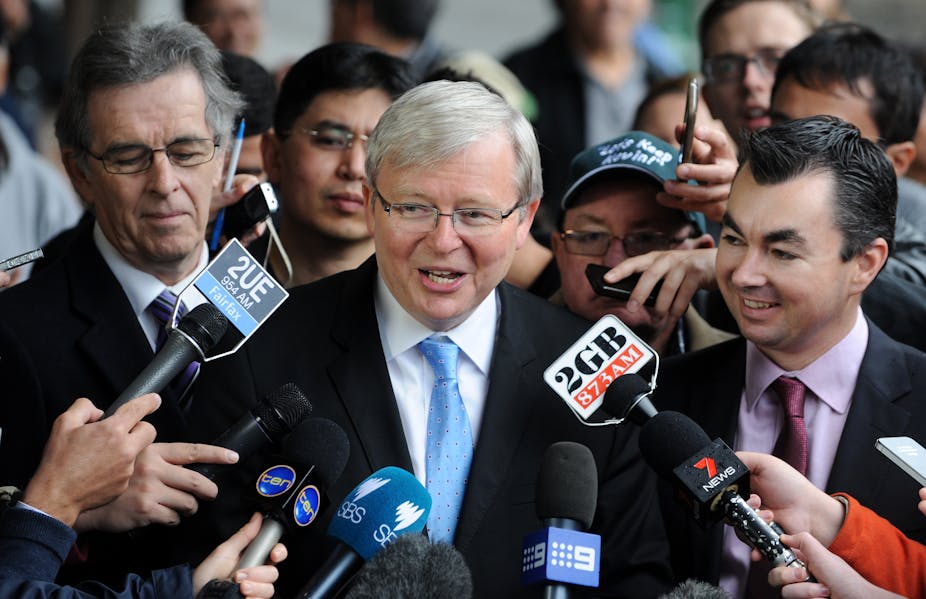It has been almost one month since Kevin Rudd returned to The Lodge. Rudd was charged with the responsibility of making Labor competitive in the upcoming election.
But what do his actions since taking over from Julia Gillard tell us about the difficulties facing leaders, especially in trying to confront the policy problems politicans feel the public wants “solved”? Indeed, is sound policy being sacrificed for the sake of blunting the opposition’s attacks?
Gillard as a ‘trend setter’?
When Gillard became prime minister in 2010 she argued that the Labor government was losing its way. It was her responsibility, she argued, to lead the party back on the right track. Gillard quickly moved to ameliorate issues that were seen to be problematic for the government. One of these included reworking the proposed Resource Super Profits Tax.
Gillard also recommitted the government to establishing a carbon pricing scheme, despite Labor’s failure to pass Emission Trading Scheme (ETS) bills in the Senate in 2009. Gillard also grappled with the issue of asylum seekers who arrived by boat as this was an issue that was damaging the government’s popularity. Furthermore, Gillard vowed to implement a different style of leadership. Unlike Rudd, she promised to consult more widely and use the system of cabinet government more effectively.
Satisfied that these issues were dealt with as best as possible, Gillard called the election within weeks of becoming prime minister. As we know, the 2010 election was one of the closest in Australian history and resulted in neither major party winning a majority in the House of Representatives.
Rudd’s policy problems
In a somewhat ironic twist, the major issues facing Rudd 2013 are similar to those Gillard dealt with in 2010. Rudd promised to disband the current carbon pricing scheme and move to an ETS well before Australia was due to do so. This serves two important purposes. It seeks to demonstrate to the electorate that Labor is concerned with the state of the environment and is trying to implement policies that are geared towards reducing pollution. It also distances his new government from the ultimately unpopular Gillard years.
The problem for Rudd is that by trying to solve one electoral problem, it has caused another. The shortfall in revenue caused by removing the carbon tax will now be recouped by changing Fringe Benefits Tax arrangements on company cars. This has galvanised opposition from industry groups and individuals who are concerned about the impact such changes would have on motorists and businesses.
Rudd’s deal to send asylum seekers to Papua New Guinea may also be problematic for Labor. With a spike in the number of asylum seekers arriving in Australia by boat, the government had to be seen to be on top of the issue. Labor has consistently struggled to be regarded as effective managers of asylum seeker policy, and this has led some MPs urging the party to tackle the issue more forcefully.
With his PNG plan, Rudd clearly sought to nullify perceptions that the Coalition was the most effective manager of asylum seekers. Notwithstanding the potential legal challenges and ethical questions raised by the policy, the divisions within the community on this issue are deep and may lead to further problems for Rudd and Labor.
Coupled with changes to policy, Rudd has also tackled the issue of reforming the Labor Party. The opposition has been effective in exploiting the apparent instability within Labor since Rudd was toppled by Gillard in 2010. Rudd’s recent moves to reform the Labor Party therefore were designed not only to enhance notions of democracy, but were also clearly designed to nullify the “faceless men” taunts of the opposition.

Back to the future
Like Gillard, Rudd has worked extremely hard to try and neutralise the policy problems that he believed the public wanted solved. The opinion polls showed that Rudd’s approach was more popular than his predecessor’s but still put Labor in an election-losing position.
This suggests that while Rudd’s return has made a significant impact on Australian politics, voters still identify parties, rather than individual leaders, as the dominant players. Despite Rudd’s reforms to policy and Labor organisation, voters remain unconvinced that the Labor government has effectively dealt with the issues at hand.

